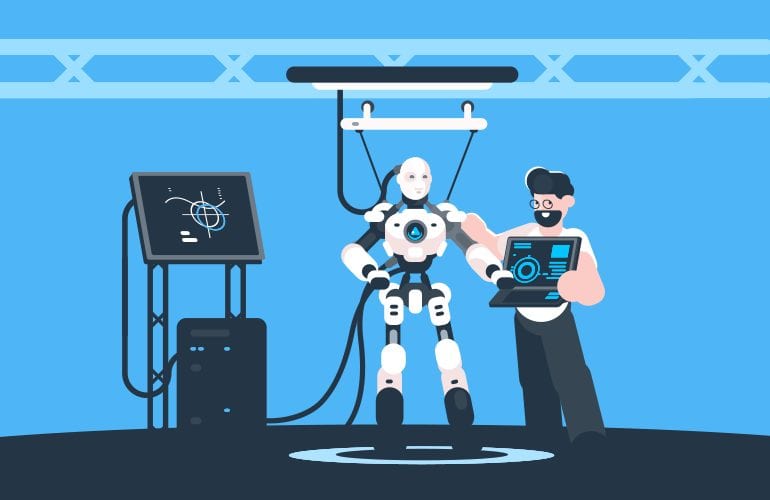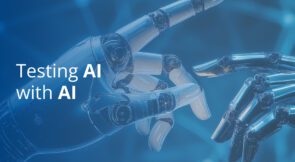We recently hosted a webinar on Artificial Intelligence and its influence on test automation with an awesome panel consisting of Jason Arbon, Oren Rubin, Dionny Santiago and me being the moderator. There were lot of great discussions on this topic and we wanted to share it with the community as well.
Below you will find the video recording of the webinar, the list of questions and answers that we couldn’t get to during the webinar and different resources to learn about AI and testing. Please feel free to reach out to me in case of any questions at raj@testim.io or any of the panel members.
Video Recording
Q&A
I am a performance engineer and am working on AI for quality gates in load testing results…that needs to be a high priority for the “future” which is “now”.How do you think bots can be used in this area?
@Jason: UI-Bots can help generate user-like load directly via the application. Though, for most load testing problems, would recommend something like charles proxy, or internal ways to spin up load, and only use the ‘expensive’ UI-based bots to see how the app works E2E for the user under load.
With rapid changes in agile requirements, how do we make the machines learn or adapt to the changes every time?
@Jason: The ai bots most folks are working on these days (vendors) will auto discover new features in the app and exercise them. At test.ai we have a set of 5k+ tests written for common flows in apps, so if you add a new feature to your app that looks like something similar on another app, the bots will auto apply that test case to the new build.
@Raj: The more tests you run, the smarter the AI becomes in detecting changes in the application. It will start detecting changes in application’s UI, element attributes and start adapting the tests automatically to these changes due to its self-healing mechanism. It can identify flaky tests, optimize waits in between steps and also proactively fix issues for us before they occur.
With BDD model and shift left and demand for testing at unit and service/api layer where does E2E testing stand?
@Jason: Dionny’s work can help generate valid permutations of existing API test case parameters/flows. Also, clustering methods can help identify misbehaving servers via logs of activity during api testing or production.
Where can we find Dionny’s paper on AI testing, you were talking about?
Dionny’s paper
Lot of automation test scripts fail due to test data issues, can we use AI to tackle those kind of issues?
@Jason: Thats a broad category of failure types, but yes, ‘AI’ can be taught to auto associate correct data with the right application states. Google also shared some ‘test selection’ findings using ML to help decide what to do with all those failing tests: https://testing.googleblog.com/2018/09/efficacy-presubmit.html
I wanted to understand, what does really mean by AI in testing?if it mean by machine will perform testing? if machine will test then if they will be already defined with scenarios which needs to be tested? is it same as automation testing as there also we don’t need manual intervention?
@Jason: Generally, AI in testing, means applying machine learning / AI techniques to test applications. There is also ‘Testing AI’ which refers to approaches to test AI/ML-based products and features. There are a variety of ways to apply this to testing, some leverage pre-written test cases and automatically execute the tests, create variations, or analyze the results. Some systems are trained to mimic general human behavior and can execute basic ‘flow testing’ for many apps, without pre-written test scenarios. The bots we build at test.ai can read BDD/Scenarios and execute them against a set of applications. As for need for human intervention, like automation, there is still the need for plenty of human intervention in AI-based testing approaches these days 🙂 Humans gather oracle/training data for the AI. Humans measure the correctness of the ‘AI’, and humans evaluate the significance of the AI-based test results as they relate to business/shipping decision.
@Raj: In addition to what @Jason was saying, I wanted to mention that, AI can have a positive impact on several facets of software testing especially test automation. There have been so many different tools and frameworks that have come up trying to solve different kinds of problems related to test automation but one problem that has been a constant challenge till date, is the aspect of “maintenance”. One of the main reasons for this is the use of static locators. With static locators, we use only one attribute of an element to uniquely identify it on a page and if this changes, the test breaks and as testers we end up spending a considerable amount of time troubleshooting the problem and fixing it. Based on research, about 30% of testers’ time is consumed in just maintaining tests. Can you imagine the opportunity cost associated with this effort? It is mind blowing. Testers’ time is valuable and better spent on actually exploring the application and providing information to help stakeholders make informed decisions about the product. With AI based testing we can overcome this problem by using dynamic locators. Dynamic Locators is a concept where we use multiple attributes of an element to locate it on on the page instead of a single attribute. This way, even if one attribute changes, the element can still be successfully located with the help of other attributes that have already been extracted from the DOM by the AI.
Can you guys elaborate on how do AI-based tests learn acceptance criteria that normally has to be defined by humans?
@Jason: Depends on the AI system being used. The bots at test.ai execute human-written test cases. Acceptance tests are written at a very high level of abstraction, and the bots do all the test execution. Reporting is as normal for test automation. In summary, just tell the bots what your acceptance criteria are.
What an automation tester needs to learn to align with the future of ai in testing ?
@Jason: A good set of links to learn are here: https://www.linkedin.com/pulse/links-ai-curious-jason-arbon/ . You can also start to leverage/experiment with “AI” via the current testing vendors. If you are already familiar with selenium/appium like testing, there is a new open source API that uses AI for element selection that you can use today: https://medium.com/testdotai/adding-ai-to-appium-f8db38ea4fac?sk
Is AI platform dependent. like desktop application or web/mobile?
@Jason:
Depends on the AI approach/solution. Many are platform dependent. The bots we build at test.ai though are not platform dependent–a key feature. The bots are platform-independent as the machines are trained to recognize UI elements much like humans do, and humans are platform dependent ;).
Is there an Open Source project that allows to apply AI to locate the elements?
@Jason: Yes, for appium today and likely Selenium soon: https://medium.com/testdotai/adding-ai-to-appium-f8db38ea4fac?sk
How can AI be used for improving test coverage ?
@Jason: AI can help generate many more validate test scenarios than a human could create. AI also enabled re-use of test artifacts so a test written for one app, can also execute on a similar app with no human intervention.
@Raj: Now with AI, you can also connect your production apps to the testing cycle. This means that we can create tests based on actual flows done by the user in production. Also, the AI can observe and find repeated steps and cluster them to make reusable components in your tests. For Example – Login, Logout scenarios. So now we have scenarios that are actually created based on real production data instead of us assuming what the user will do in production. In this way, we also get good test coverage based on real data.
Will AI testing replace selenium appium and all tools and technologies?
@Jason: Asymptotically.
Is AI really better?
@Dionny: Traditional testing teams focus on either a single app, or a small set of apps; whereas, AI can learn from millions of different examples and apps. The more data we show the AI, the better it gets. Also, the AI never gets tired!
What are the immediate benefits of using AI?
@Raj: Apart from the benefits already mentioned in the answers above, AI can also help in increasing team collaboration. The field of test automation has historically been a technical tester focused community. This stigma can also change. What this means is, non-technical resources no longer need to fear code and technology, rather AI will help to bridge the gap between the technical know-how and authoring and execution of tests making life easier for teams.
Will our jobs be replaced?
@Raj: Over the past decade technologies have evolved drastically, there have been so many changes happening in the technology space but one thing constant is human testers’ interaction with them and how we use them for our needs. The same holds true for AI as well. Secondly, to train the AI, we need good data combinations (which we call a training dataset). So to work with modern software we need to choose this training dataset carefully as the AI starts learning from this and starts creating relationships based on what we give to it. Also, it is important to monitor how it is learning as we give different training datasets. This is going to be vital to how the software is going to be tested as well. We would still need human involvement in training the AI. Finally, it is important to ensure while working with AI the security, privacy and ethical aspects of the software are not compromised. All these factors contribute to better testability of the software. We need humans for this too.
In summary, we will continue to do exploratory testing manually but will use AI to automate processes while we do this exploration. It is just like automation tools which do not replace manual testing but complement it. So, contrary to popular belief, the outlook is not all ‘doom-and-gloom;’ being a real, live human does have its advantages. For instance, human testers can improvise and test without written specifications, differentiate clarity from confusion, and sense when the ‘look and feel’ of an on-screen component is ‘off’ or wrong. Complete replacement of manual testers will only happen when AI exceeds those unique qualities of human intellect. There are a myriad of areas that will require in-depth testing to ensure safety, security, and accuracy of all the data-driven technology and apps being created on a daily basis. In this regard, utilizing AI for software testing is still in its infancy with the potential for monumental impact.
Will intelligence machines take over the world?
@Raj: Hollywood movies do have an influence on our lives don’t they 🙂 ? At most of the conferences I speak at, there is this weird notion that, in 3 years, robots are going to take over the world and we will become slaves to them. Which sounds interesting on paper but in reality I don’t think that is going to be the case.
Currently there are are some section of the people who believe fully developed AI that can react and think like humans , will be developed by 2055 and there are are other sections of people who think it will take several hundred years for that to happen. No one knows the exact answer yet. That being said, there are several organizations trying to ensure the AI currently being developed is safe for the human society. For example – The future of life institute was formed for the exact same purpose and has the brightest minds in the field working in that group on AI safety research. We also have groups like the World Economic forum keeping a close eye on the impact of Artificial Intelligence on society.
So, I do not think machines will take over the world, just yet!!! 🙂
Resources
Courses
- https://www.coursera.org/learn/machine-learning
- https://www.coursera.org/specializations/deep-learning
- https://eu.udacity.com/course/machine-learning-engineer-nanodegree–nd009
And there are more courses available online. Just google search for “Deep Learning courses”, “Machine Learning courses” as keywords.
Free Resources/Courses
- Andrew Ng’s Machine Learning Course on Youtube
- Lex Fridman, Deep Learning Course on Youtube
- AIST (AI for software testing) Group started by Jason Arbon and Tariq King
- Links to free AI learning resources
- Latest news and developments in Artificial Intelligence
- The truth about AI and Test Automation
Books




